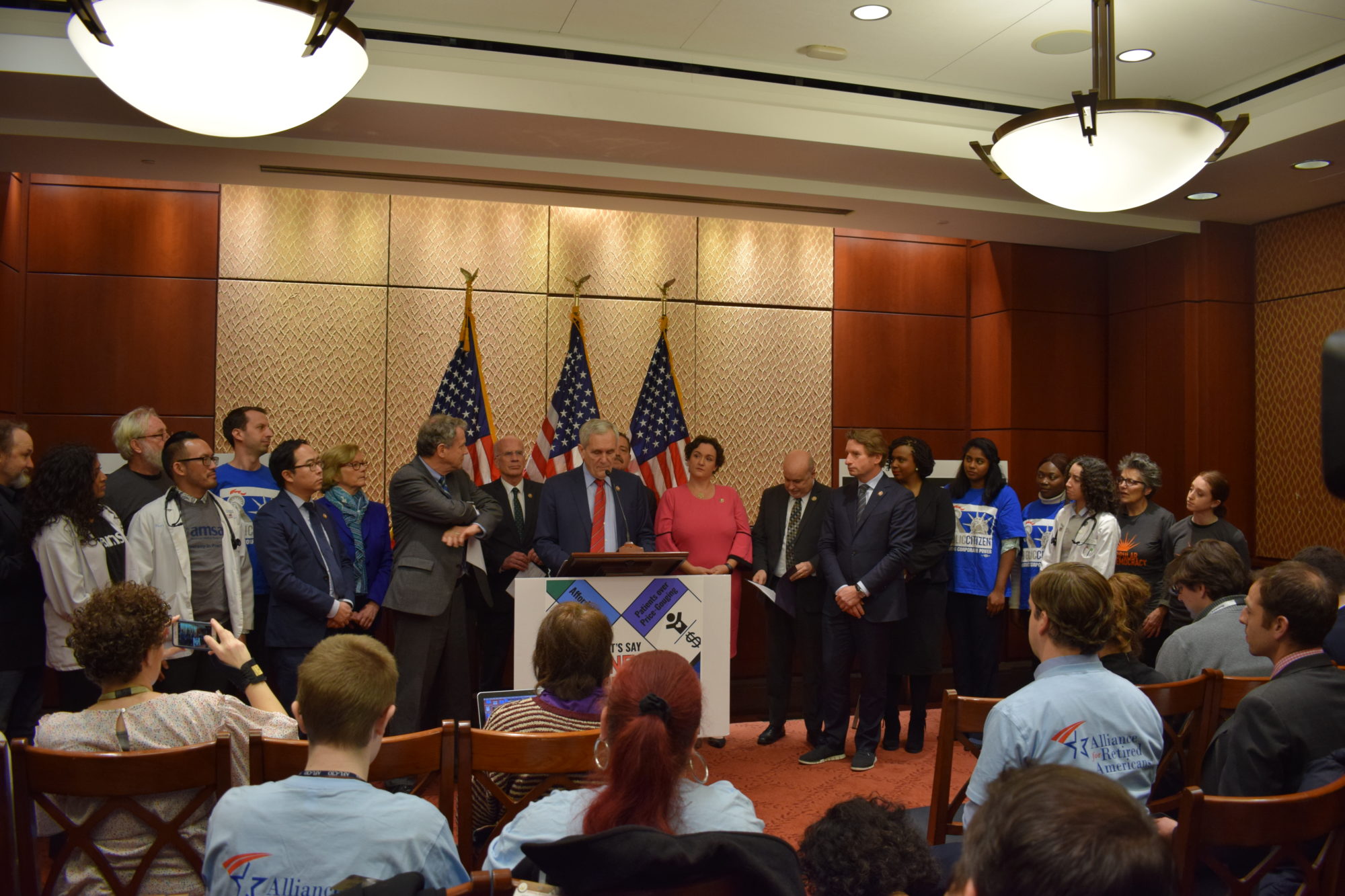Drug Price Battle Heats Up in Congress
Public Citizen News / March-April 2019
By Angela Bradbery

This article appeared in the March/April 2019 edition of Public Citizen News. Download the full edition here.
For 23 years, Wisconsin resident Diane Whitcraft took a medication for multiple sclerosis that helped keep the disease in check. But two years ago, when she switched to Medicare, her out-of-pocket costs soared from $50 to $100 per month to $7,000 per month.
During the years she had been taking the drug, the price jumped from $10,000 annually to $86,000 annually.
Whitcraft had “a discussion with her husband that you wouldn’t wish upon anybody – whether to keep taking the medication,” said U.S. Sen. Tammy Baldwin (D-Wis.) who relayed Whitcraft’s story during a Feb. 7 press conference. “They decided that she would stop. The financial impact of her continuing was too much.”
At the press conference, organized by U.S. Rep. Lloyd Doggett (D-Texas), lawmakers introduced the Medicare Negotiation and Competitive Licensing Act, designed to make medications more affordable by allowing the government to negotiate drug prices for Medicare Part D directly with pharmaceutical corporations.
Now, the government is not allowed to negotiate with drugmakers on the prices of medications provided under Medicare Part D. The drug company names its price, and the government – the taxpayers – must pay.
“The prohibition on Medicare negotiation is utterly irrational,” said Robert Weissman, president of Public Citizen. “It is the law of the land for one reason only: the corrupting political influence of Big Pharma. This proposal responds to the overwhelming demand for action on drug pricing, introducing a dose of common sense and overcoming one of the shameful and corrupt corporate giveaways in American history.”
The same day, Sens. Sherrod Brown (D-Ohio) and Kirsten Gillibrand (D-N.Y.) and Reps. Mark Pocan (D-Wis.) and Marcy Kaptur (D-Ohio) introduced the Stop Price Gouging Act, which penalizes corporations that raise pharmaceutical prices beyond the level of inflation.
What the bills would do
Americans are furious about Big Pharma’s rip-offs. An astounding 92 percent of Americans favor Medicare negotiation, a 2017 Kaiser Family Foundation poll found.
While the government can’t negotiate for Medicare Part D drug prices, the Veterans Health Administration (VHA) can negotiate. Public Citizen in 2015 found that had Medicare Part D paid what the VHA did for prescriptions, it would have saved $16 billion – in just one year.
The savings almost surely would be larger now than five years ago. And if empowered to negotiate for Medicare Part D drug prices, the government could obtain savings significantly greater than the VHA is able to, simply because of the scale of Medicare purchases, said Steve Knievel, advocate for Public Citizen’s Access to Medicines program. By not negotiating bulk purchases, pharmaceutical corporations can – and do – price gouge taxpayers.
Under Doggett’s legislation, if a brand-name manufacturer refuses to agree to a reasonable price, the government would authorize generic competitors to enter the market and provide the product affordably, while paying a reasonable royalty to the brand-name company. The licensing approach avoids even the hypothetical problem of important drugs not being available. It also increases the government’s leverage, and therefore would increase the savings from negotiation.
In his State of the Union address, President Donald Trump claimed that the cost of prescription medications is falling. In fact, the Associated Press found that Big Pharma spiked drug prices 96 times for each reduction in price.
“Big Pharma has baked constant increases into its business model,” Weissman said. “The Big Pharma corporations raise prices constantly simply because they can, without regard to the economic impact on patients, or even the fact that high charges lead to rationing of lifesaving treatments.”
The Stop Price Gouging Act would remove the incentive for spikes by imposing financial penalties proportionate to companies’ unjustified increases.
The battle ahead
Passing the bills will not be easy. The pharmaceutical industry is one of the largest spenders on lobbying in Washington, D.C. And some of the tactics it uses are questionable.
“Dear Members of Congress,” began a Jan. 15 email from the National Osteoporosis Foundation to lawmakers. “As the 116th Congress begins, 224 patient organizations have joined together to express our concerns with proposals that would repeal the non-interference (NI) clause in the Medicare Part D program.”
The note urges lawmakers to oppose giving the government authority to negotiate directly to lower Medicare Part D medicine prices.
But nearly half of those 224 signers don’t represent patients at all, a Public Citizen analysis found. Instead, the list was dominated by industry groups and organizations that have received money from prescription drug manufacturers.
Fifty-three of the signers were industry groups, including trade associations like Biotechnology Innovation Organization and U.S. Chamber of Commerce, that have an interest in maximizing pharmaceutical manufacturing profits on behalf of their members.
Of the 120 patient organizations that signed, a little more than half have received financial support from prescription corporations.
“Making medicines affordable is one of the most important issues before this Congress,” said Peter Maybarduk, director of Public Citizen’s Access to Medicines program. “It’s critical that lawmakers have accurate information and that groups lobbying Congress disclose their financial interests. Big Pharma has a long history of manipulating this debate. We can’t let that happen.”